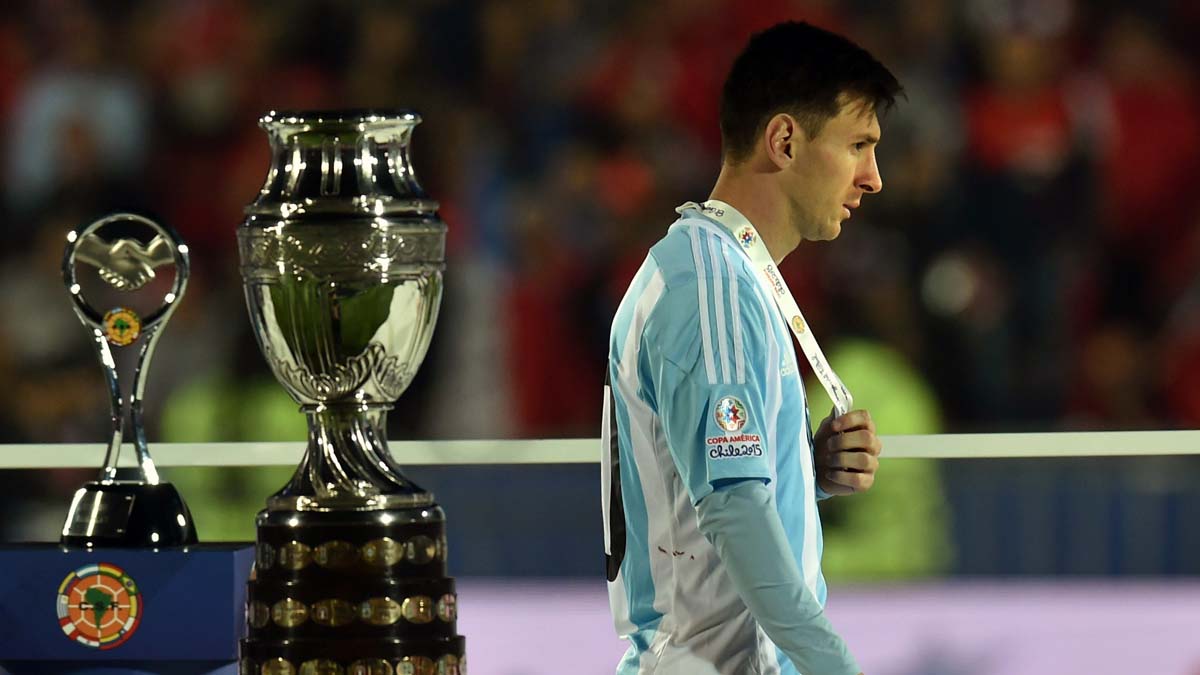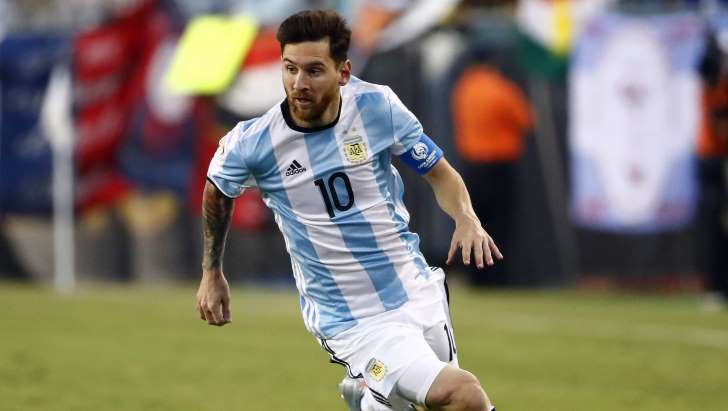
Leander Schaerlaeckens, FC Yahoo
EAST RUTHERFORD, N.J. – Lionel Messi’s apparent final act as an Argentina player was to blast a penalty kick over the crossbar, inducing a chain of events that ended in his retirement (just three days after his 29th birthday) from the national team he brought to three Copa America finals and a World Cup championship game.
After 120 minutes of frightfully physical but scoreless soccer here in the final of the Copa America Centenario on Sunday night, La Albiceleste and Chile once again took their final to a shootout – just as they had last year in the regular edition of this tournament. And yet again, Chile prevailed on penalties.
That made it three consecutive summers in which Messi and Argentina had lost the final of a major tournament in extra time. In 2014, it was the World Cup final, which was decided by Germany’s 113th-minute goal. Last year, the outcome was the same as this year, falling to Chile in the Copa America final on penalties.
Messi was Argentina’s first kicker in Sunday’s shootout, airmailing his effort. That didn’t seem so consequential at the time, as Chile’s Arturo Vidal, shooting first, had already seen his soft effort saved by Sergio Romero. But Lucas Biglia would miss the Argentines’ fourth attempt as well, and the Chileans, having missed no other shots, won 4-2 to become the champions yet again.
He emerged from the locker room more than an hour after the final whistle after accepting yet another runner-up medal. Accompanied by a burly security guard and a police officer, he scampered by the hordes of journalists shouting his name and made a beeline for a cluster of TV cameras from Argentina’s national networks. He walked upright. His hair was coiffed just so. His reddish beard was tidily kept. His growing collection of tattoos poked out of his national team-issued T-shirt and shorts. He mumbled a few things, avoiding eye contact. And then he walked off.
Most were too far away to hear what he said, pushed out of the crush of human flesh straining to get near him. But soon enough, word emerged of a cataclysmic announcement.
It’s difficult,” some outlets reported him saying. “It’s a tough moment for any kind of analysis. In the locker room I thought this might be the end for me on the national team. This isn’t for me.”
“The national team is over for me,” other reports quoted him as saying. “It’s not for me after four finals. The decision is taken, I believe.”
Plainly, Messi was distraught over having missed a penalty. And he was perhaps disillusioned over not having played a bigger role in the game. But that was probably more of a credit to Chile’s suffocating defensive pressure than it was a knock on the record five-time world player of the year.
Either way, he’s had enough. For now, at least.
And some context is required here. Messi has always said he is proudly Argentine, but he has a complicated relationship with his national team and its fans – going beyond the dysfunction within the Argentina federation and the friction that it causes.
Messi was only 13 when he left his home in Rosario to join Barcelona’s youth academy. He grew up in Catalonia and became a man there and then a star. He’s lived in Spain longer than he has in Argentina. And it took him a good few years with the national team to become as influential and successful as he had been with Barca.
There are plenty of good reasons for this, of course. He didn’t know the players as well. The system wasn’t designed around him so seamlessly as at Barcelona. For a lot of those years, Argentina was a deficient team, surrounding him with markedly lesser players than his club did. These valid explanations were not always understood at home.
So now comes his decision, perhaps taken rashly or perhaps mulled over for months or even years, to stop donning the iconic white and light blue.
Nobody denies that Messi’s experiences have been hard to swallow.
“There’s nothing we haven’t already said about the weight decisive matches bear over us, the finals of these past few years, and he is the way any football player must be when he participates and gets to a final and loses,” Argentina manager Gerardo Martino said just a short while before Messi made his announcement. “And certainly to lose again is painful.”
So dispiriting was a third consecutively lost final, in fact, that after the game, word got out that defender Javier Mascherano was also quitting the national team. Perhaps striker Sergio Aguero as well, it was rumored.
If he sticks by his decision, Messi will hardly be the first national team star to bookend his international career long before he quits the game altogether. It’s an understandable move.
Playing deep into a tournament every summer had been an added burden to a player who already carries a heavy workload with the most successful club of the last decade. As he nears his 30s, eliminating the summer tournaments and a great deal of travel from his list of responsibilities will likely extend his prime. Which is to say nothing of the mental weight of forever carrying a fanatical and demanding nation’s hopes ever since he first got to a Copa America final with Argentina in 2007 – losing to Brazil 3-0.
If this really is it for Messi, he leaves one of the world’s most storied national programs as its all-time leader in goals with 55 – he eclipsed the great Gabriel Batistuta with a stupendous free kick against the U.S. during a 4-0 romp in the semifinals – and with a Golden Ball as the 2014 World Cup’s best player in his bloated trophy case.
That will be scant consolation. For him or Argentina.
And while his decision is surprising and feels rash, it’s also defensible and understandable.
Leander Schaerlaeckens is a soccer columnist for Yahoo Sports. Follow him on Twitter @LeanderAlphabet.

